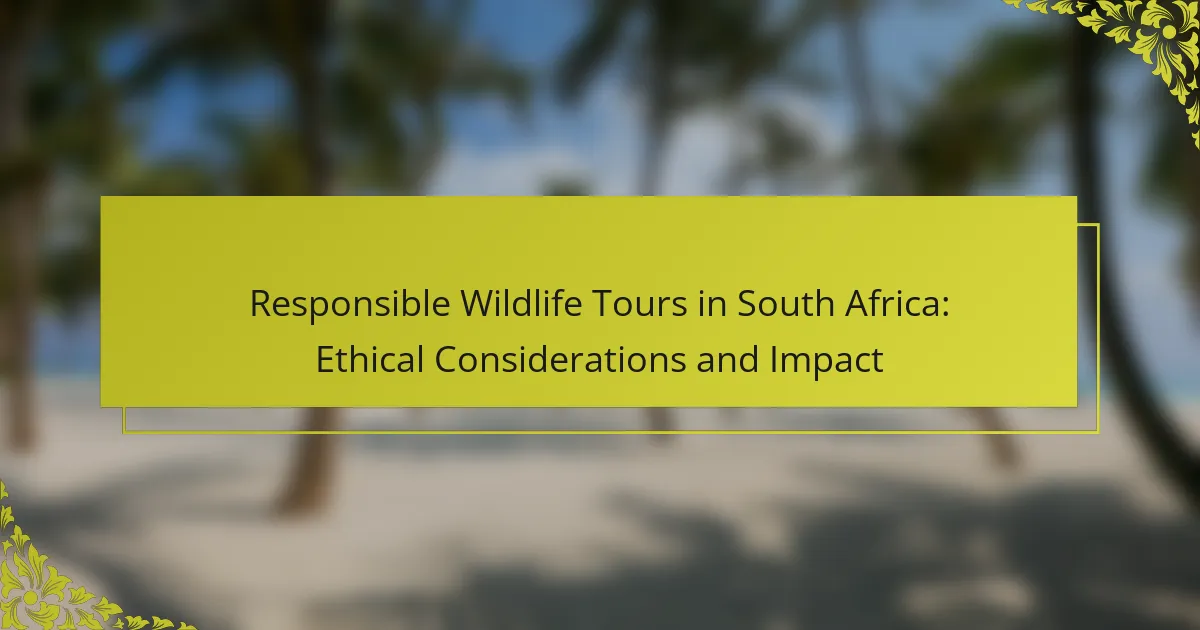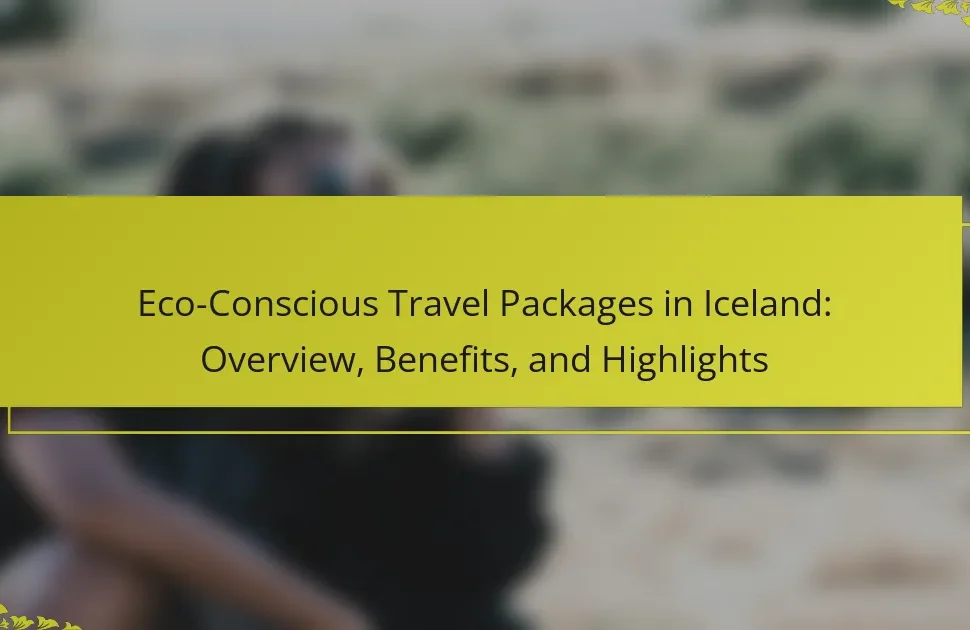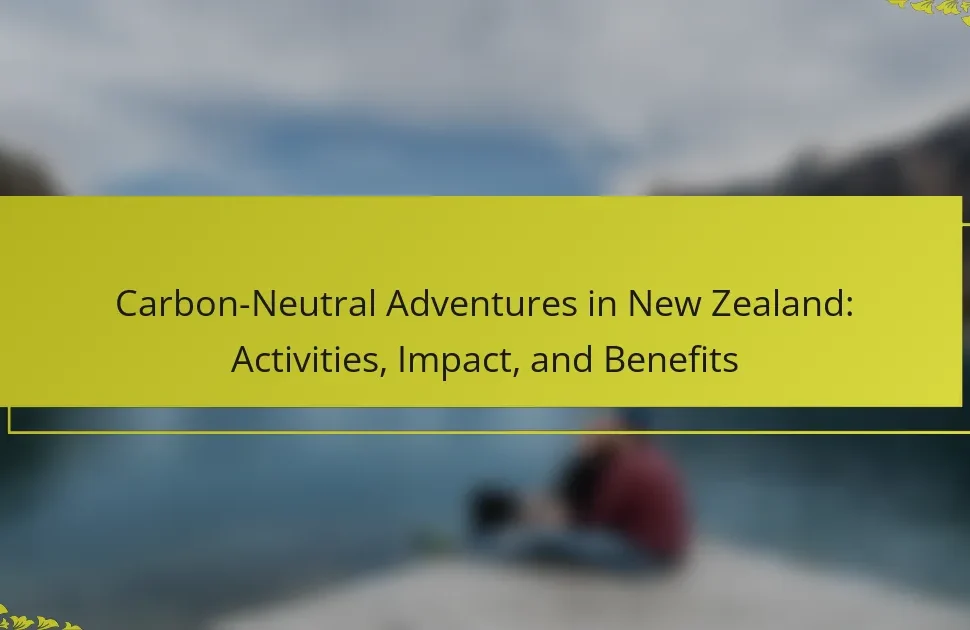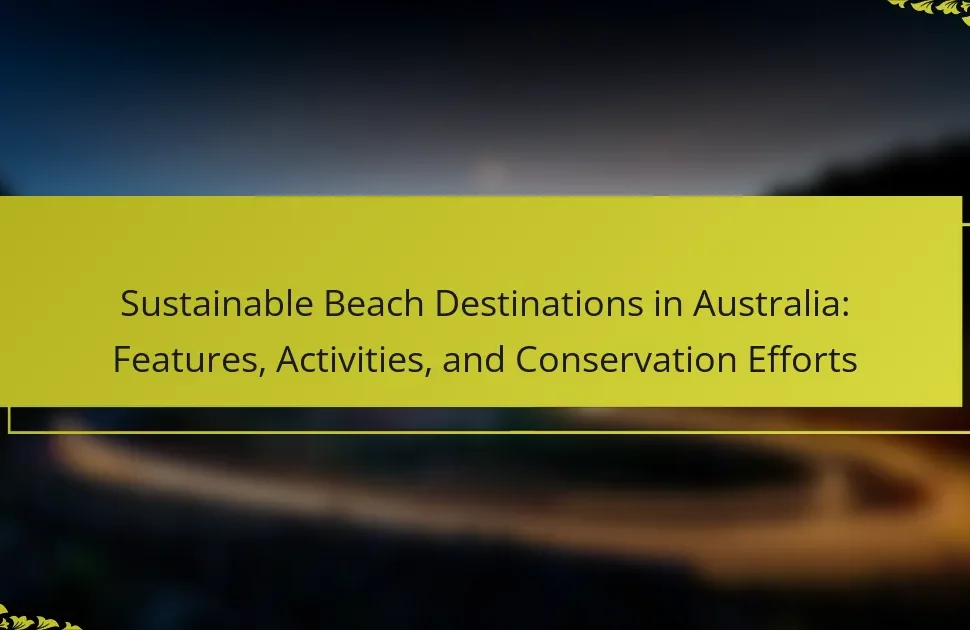Responsible wildlife tours in South Africa offer unique opportunities for immersive experiences while prioritizing ethical considerations. These tours emphasize animal welfare, conservation efforts, and community engagement. Tour operators are encouraged to minimize human impact, respect natural habitats, and educate tourists about local ecosystems. By choosing responsible options, travelers can contribute positively to wildlife preservation and support sustainable tourism practices.
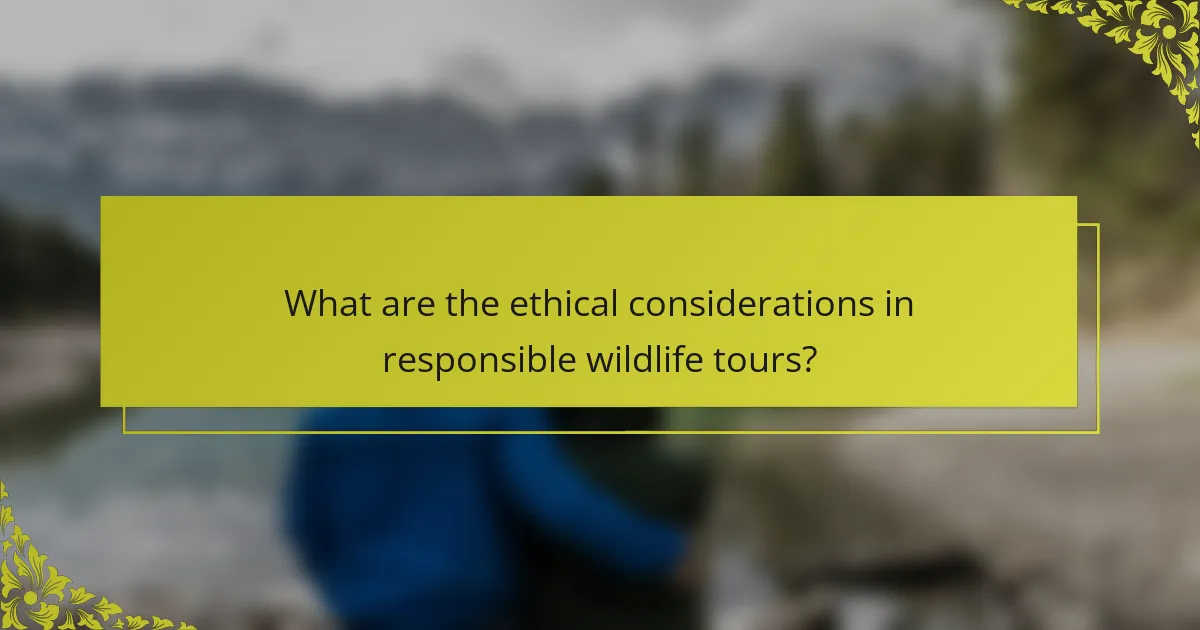
What are the ethical considerations in responsible wildlife tours?
Responsible wildlife tours must prioritize ethical considerations to ensure animal welfare and environmental sustainability. Key ethical considerations include minimizing human impact, respecting natural habitats, and promoting conservation efforts. Tour operators should follow guidelines that prevent wildlife exploitation and ensure that interactions do not disturb animals. Furthermore, educating tourists about local ecosystems enhances awareness and fosters a sense of responsibility towards wildlife preservation. Supporting local communities through sustainable tourism practices also contributes positively to the overall impact of wildlife tours.
How do wildlife tours impact local ecosystems?
Responsible wildlife tours can positively impact local ecosystems by promoting conservation and sustainable practices. These tours often generate revenue that supports habitat preservation and local communities. They encourage visitors to appreciate wildlife, fostering a sense of environmental stewardship. Additionally, responsible practices can mitigate negative effects on wildlife, such as habitat disruption and stress. Engaging local guides enhances cultural exchange and ensures that economic benefits reach the community, reinforcing the importance of preserving natural habitats.
Why is animal welfare a priority in wildlife tourism?
Animal welfare is a priority in wildlife tourism to ensure ethical treatment and conservation of species. Responsible wildlife tours promote sustainable practices that protect habitats and support local communities. These tours help raise awareness about the importance of preserving wildlife and their ecosystems. Additionally, prioritizing animal welfare enhances the overall experience for tourists, fostering a deeper connection with nature. Such ethical considerations contribute to the long-term viability of wildlife tourism in South Africa.
What role do local communities play in wildlife tourism ethics?
Local communities play a crucial role in wildlife tourism ethics by ensuring sustainable practices and protecting ecosystems. Their involvement fosters respect for wildlife and cultural heritage. Community-led initiatives often enhance visitor experiences while promoting conservation efforts. Engaging local populations in decision-making processes allows for ethical tourism that benefits both wildlife and communities.
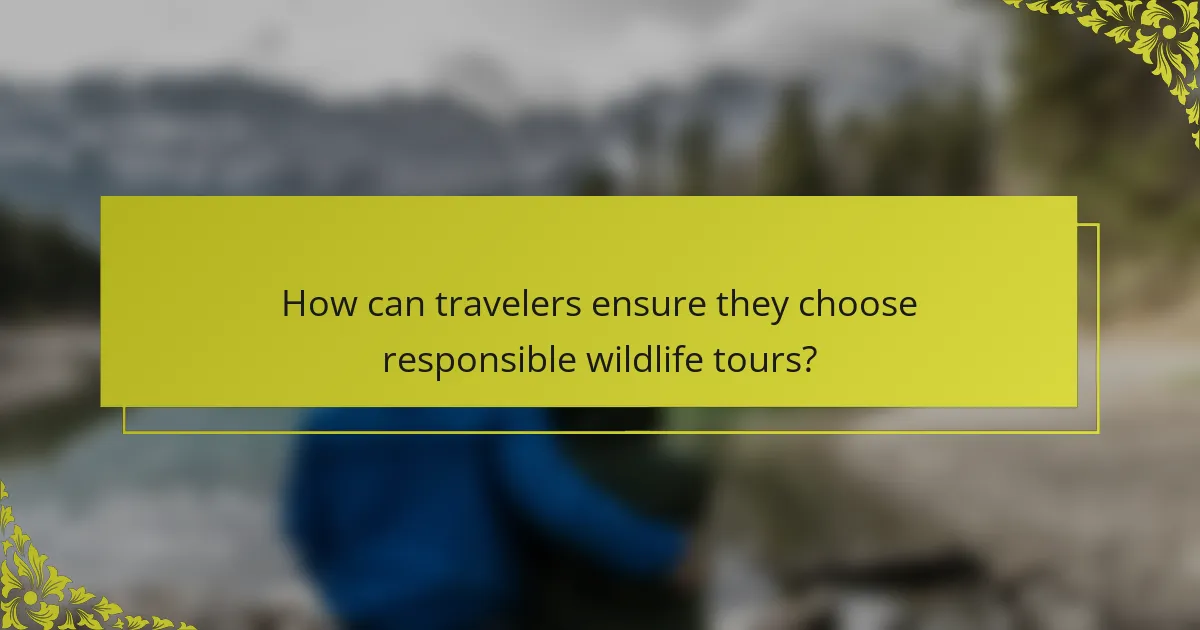
How can travelers ensure they choose responsible wildlife tours?
Travelers can choose responsible wildlife tours by researching operators, prioritizing ethical practices, and assessing their impact on conservation. Look for tours that promote animal welfare and support local communities.
1. Research tour operators thoroughly. Check for certifications and reviews that highlight ethical practices.
2. Prioritize tours that focus on conservation efforts. Choose operators that contribute to wildlife protection and habitat preservation.
3. Assess the impact on local communities. Select tours that engage and benefit local residents economically and socially.
4. Avoid tours that exploit animals. Ensure the experience does not involve harmful interactions or confinement of wildlife.
Which certifications should travelers look for in wildlife tour operators?
Travelers should look for certifications like the Global Sustainable Tourism Council (GSTC) and the Fair Trade Tourism certification. These credentials ensure that wildlife tour operators adhere to ethical practices and sustainability standards. Additionally, the International Ecotourism Society (TIES) certification indicates a commitment to responsible tourism, which enhances conservation efforts and community involvement. Operators with these certifications typically prioritize animal welfare and environmental protection, providing a more responsible travel experience.
What questions should travelers ask before booking a wildlife tour?
Travelers should ask about the tour operator’s ethical practices, animal welfare policies, and community impact before booking a wildlife tour. Additionally, inquire about group sizes, guides’ qualifications, and conservation contributions. These questions ensure responsible tourism and support ethical wildlife experiences.
How can travelers assess the sustainability of a wildlife tour?
Travelers can assess the sustainability of a wildlife tour by evaluating its ethical practices, conservation efforts, and community involvement. Look for tours that prioritize animal welfare, support local ecosystems, and engage with surrounding communities. Check for certifications from recognized conservation organizations, as these indicate adherence to sustainable practices. Additionally, consider the tour’s impact on wildlife habitats and whether it promotes education and awareness about conservation issues.
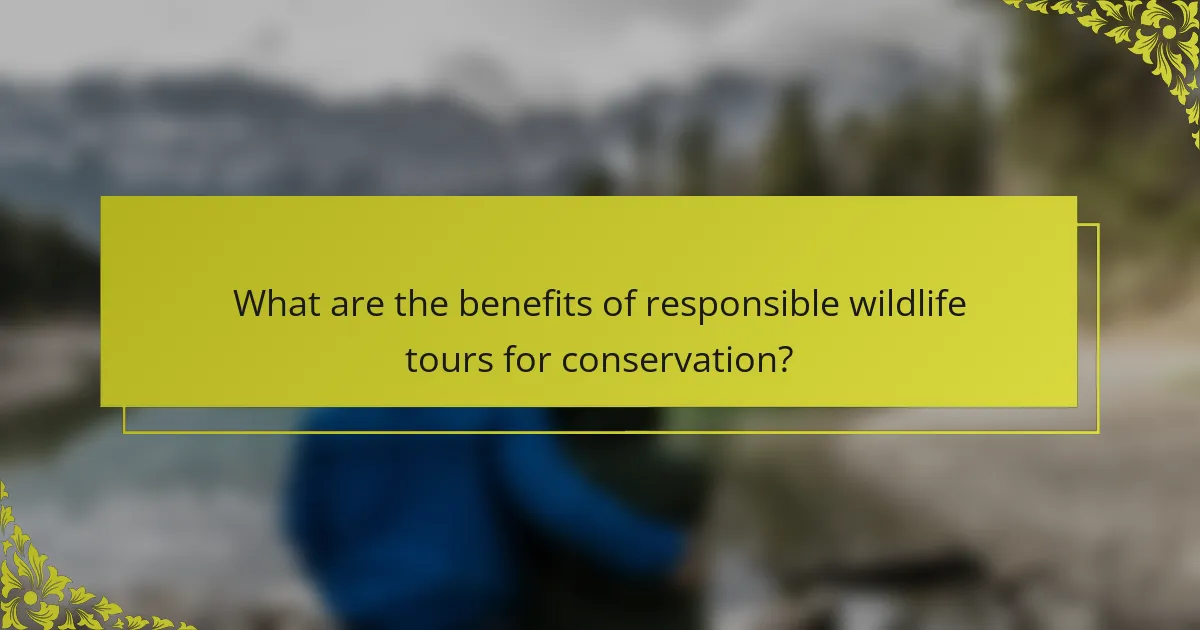
What are the benefits of responsible wildlife tours for conservation?
Responsible wildlife tours support conservation by promoting ethical interactions with nature and generating funds for habitat protection. These tours raise awareness about endangered species and foster a sense of stewardship among participants. They often contribute to local economies, providing financial incentives for communities to protect their wildlife. Additionally, responsible practices minimize environmental impact and encourage sustainable tourism, ensuring the long-term viability of ecosystems.
How do responsible wildlife tours contribute to habitat preservation?
Responsible wildlife tours contribute to habitat preservation by promoting conservation efforts and generating funding for protected areas. These tours raise awareness about the importance of biodiversity and ecosystems. Tour operators often collaborate with local communities to ensure sustainable practices, which helps maintain habitats. Additionally, responsible tourism reduces the pressure on wildlife through regulated visitor numbers, minimizing human impact. As a result, these tours foster a sense of stewardship among tourists, encouraging ongoing support for conservation initiatives.
What economic advantages do responsible wildlife tours provide to local communities?
Responsible wildlife tours provide significant economic advantages to local communities by creating jobs and generating revenue. These tours often involve local guides, accommodations, and transportation, which directly benefit the community. As a result, responsible tourism fosters sustainable practices that preserve wildlife and habitats while supporting local economies. Additionally, funds from wildlife tours can be reinvested in community development and conservation efforts, enhancing the overall quality of life for residents.
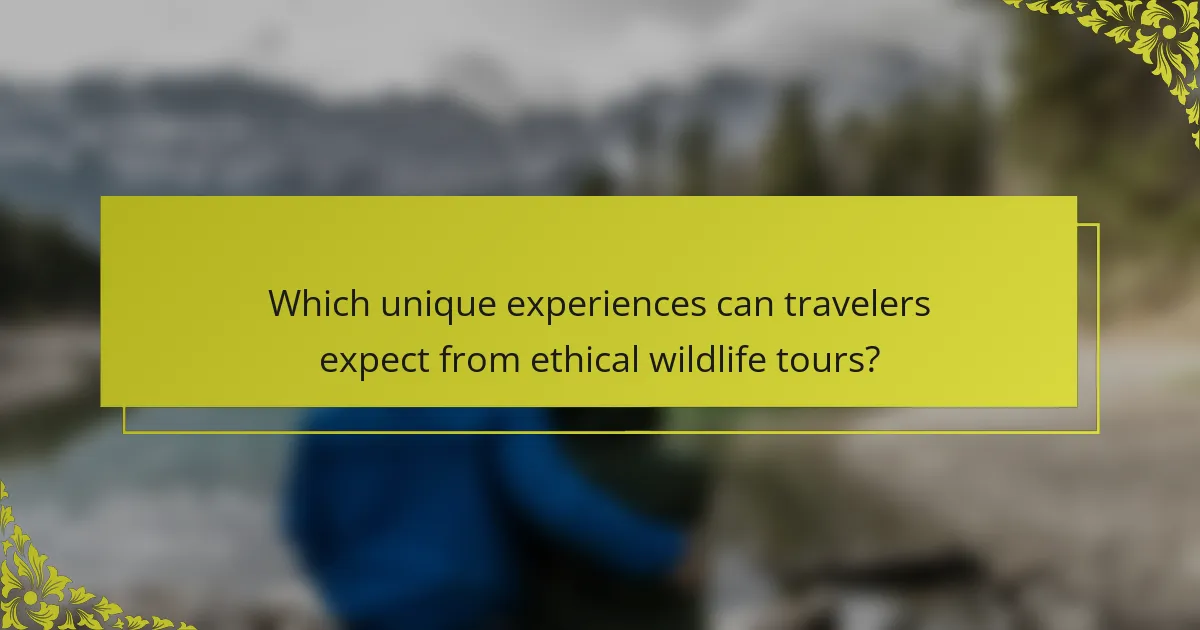
Which unique experiences can travelers expect from ethical wildlife tours?
Travelers can expect immersive and transformative encounters with wildlife on ethical tours. These experiences prioritize animal welfare and conservation, offering unique insights into natural habitats and local ecosystems.
Participants often engage in guided walks with conservationists, learning about species’ behaviors and the importance of biodiversity. Tours may also include volunteer opportunities, allowing travelers to contribute directly to wildlife protection efforts.
Additionally, ethical wildlife tours often feature small group sizes, enhancing personal interactions and minimizing environmental impact. This approach fosters a deeper connection to nature and encourages responsible tourism practices.
Overall, ethical wildlife tours provide enriching experiences that promote awareness and support for conservation initiatives in South Africa.
What types of wildlife interactions are considered ethical?
Ethical wildlife interactions prioritize animal welfare and conservation. Responsible wildlife tours in South Africa should ensure minimal disturbance to animals, promote education, and support local communities. Tour operators must adhere to guidelines that protect habitats and avoid practices like baiting or feeding wildlife. Engaging in respectful observation fosters a sustainable relationship with nature.
How do guided tours differ from self-guided wildlife experiences?
Guided tours offer structured experiences led by experts, while self-guided wildlife experiences allow for independent exploration. Guided tours emphasize education and safety, often providing insights into local ecosystems. In contrast, self-guided options promote personal discovery and flexibility in pacing. Guided tours typically include transportation and access to exclusive areas, enhancing the overall experience. Self-guided tours may lack these benefits but allow for a more intimate connection with nature.
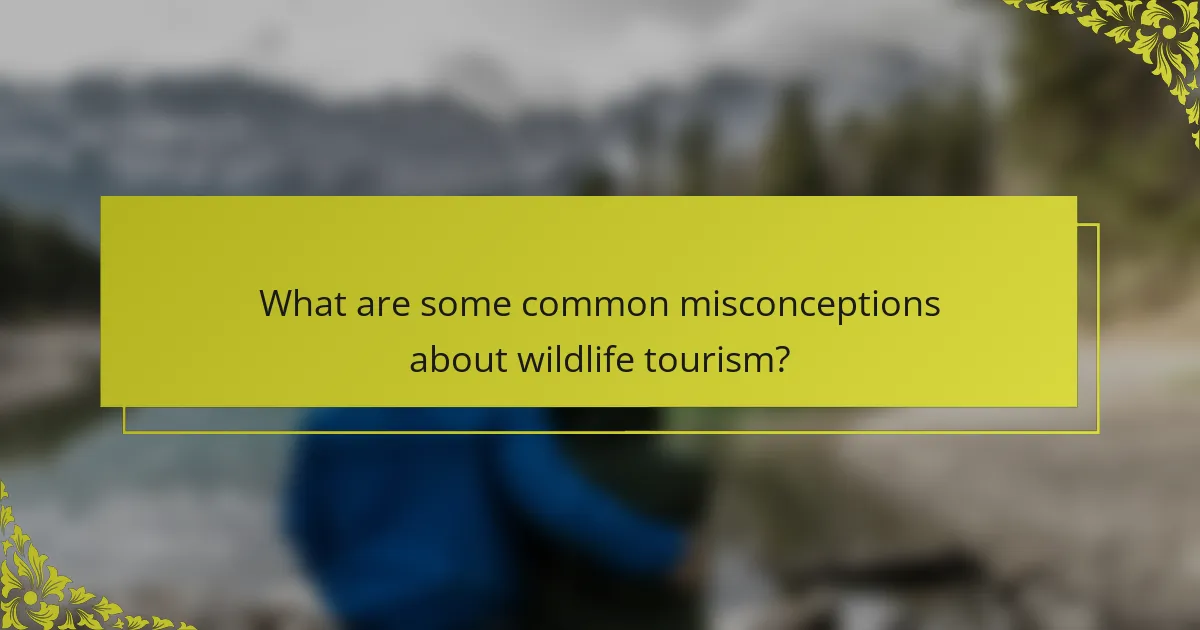
What are some common misconceptions about wildlife tourism?
Many believe wildlife tourism is inherently harmful, but responsible practices can enhance conservation efforts. Misconceptions include the idea that all tours exploit animals, that wildlife interactions are always negative, and that tourism has no positive impact. Ethical wildlife tourism can fund conservation projects, support local communities, and promote awareness. By choosing responsible tours, travelers can contribute to preserving wildlife and their habitats.
Why do some wildlife tours harm rather than help conservation efforts?
Some wildlife tours harm conservation efforts by prioritizing profit over ethical practices. Unsustainable tourism can disrupt ecosystems, disturb wildlife, and contribute to habitat degradation. For instance, overcrowding in popular areas leads to stress for animals and diminished natural behaviors. Additionally, some tours may exploit animals for entertainment, undermining conservation goals. Responsible wildlife tours should focus on education, habitat preservation, and community support to ensure a positive impact on conservation efforts.
How can misinformation affect traveler choices in wildlife tourism?
Misinformation can significantly misguide traveler choices in wildlife tourism, leading to unethical practices. Travelers may unknowingly support tours that harm wildlife or ecosystems due to false claims about conservation efforts. This misinformation can stem from misleading marketing or social media narratives, creating a false sense of security regarding the ethical implications of certain wildlife experiences. As a result, it is crucial for travelers to seek verified information and choose responsible wildlife tours that prioritize animal welfare and environmental sustainability.
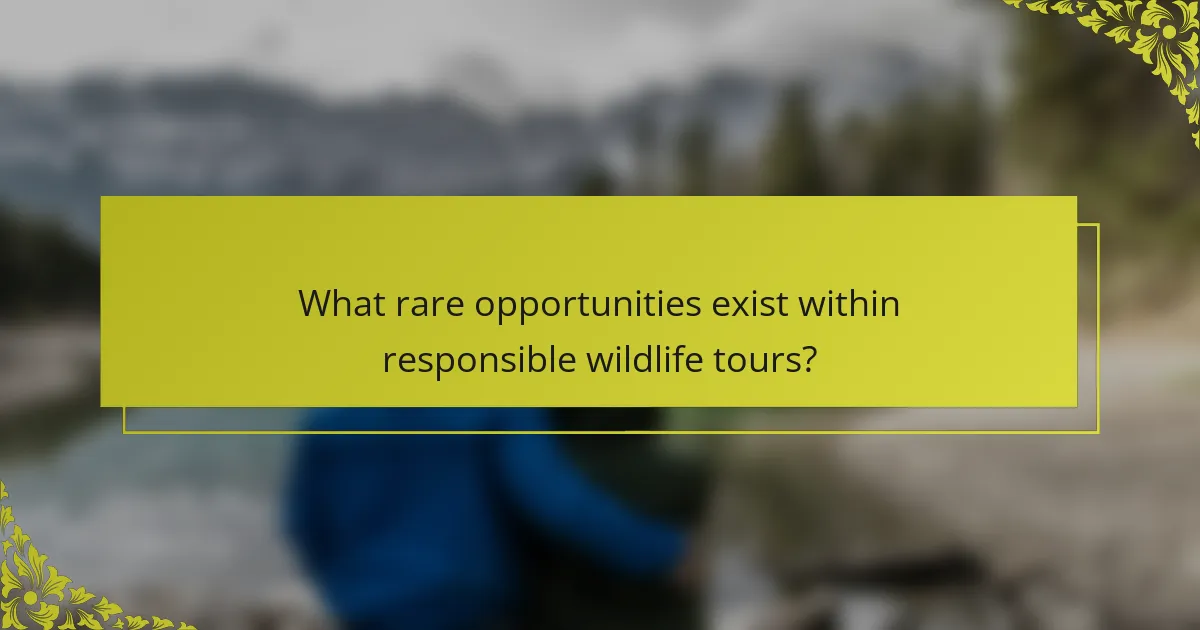
What rare opportunities exist within responsible wildlife tours?
Responsible wildlife tours in South Africa offer rare opportunities for immersive experiences that prioritize conservation. These tours can include exclusive access to protected areas, unique wildlife interactions, and partnerships with local communities. Engaging with conservation projects provides travelers with insights into species protection efforts. Additionally, some tours offer behind-the-scenes access to wildlife rehabilitation centers, enabling visitors to witness recovery processes firsthand. Such experiences enhance awareness and appreciation for biodiversity while supporting ethical tourism practices.
How can travelers participate in citizen science through wildlife tours?
Travelers can engage in citizen science during wildlife tours by collecting data on animal behavior and habitats. These tours often involve monitoring species, reporting sightings, and participating in conservation efforts.
By contributing to ongoing research, travelers help scientists gather valuable information that informs conservation strategies. For instance, documenting the presence of endangered species can aid in their protection.
Many wildlife tour operators partner with research organizations, allowing participants to contribute to real-time studies. This collaboration enhances the educational experience and fosters a deeper connection to nature.
Citizen science initiatives also promote sustainable tourism, as informed travelers advocate for ethical wildlife practices. This involvement can lead to a positive impact on local ecosystems and communities.
What exclusive access do responsible tours offer to endangered species habitats?
Responsible wildlife tours provide exclusive access to endangered species habitats by offering guided experiences that prioritize conservation. These tours often include visits to protected areas where tourists can observe animals in their natural environment without disturbing them.
Additionally, responsible tours typically involve partnerships with local conservation organizations, ensuring that a portion of the proceeds supports habitat preservation efforts. This model not only enhances the visitor experience but also contributes to the long-term sustainability of endangered species.
Unique attributes of these tours may include opportunities to participate in conservation activities, such as tracking animals or assisting with habitat restoration. Such engagements foster a deeper connection between tourists and the wildlife, promoting awareness and advocacy for endangered species.
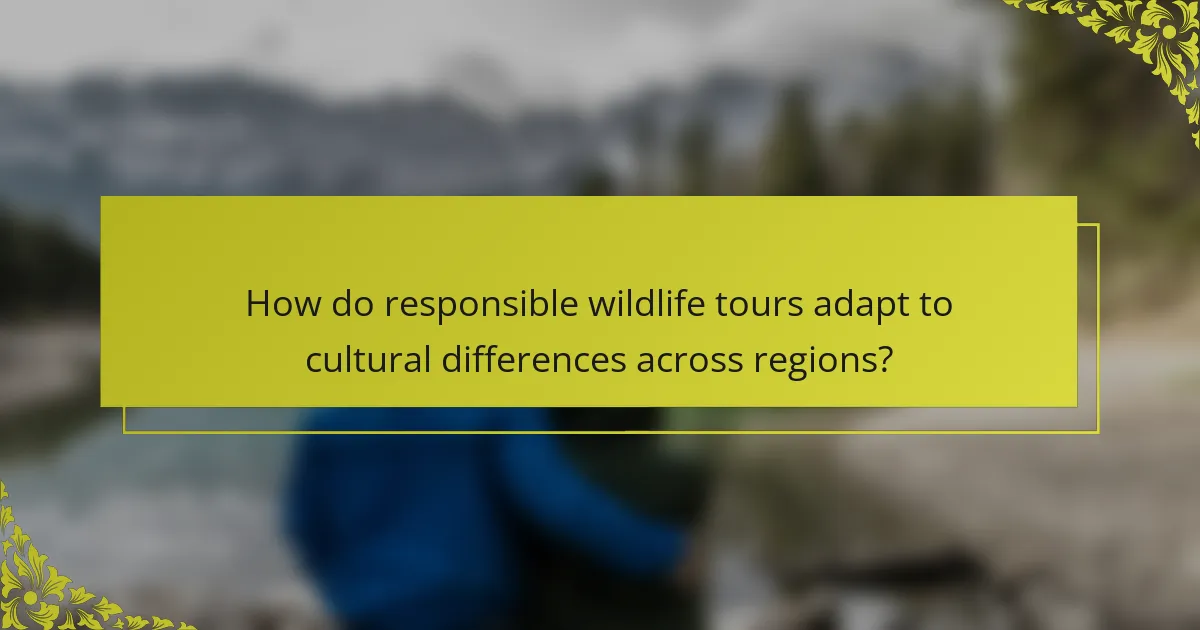
How do responsible wildlife tours adapt to cultural differences across regions?
Responsible wildlife tours adapt to cultural differences by incorporating local customs and practices into their programs. This approach fosters respect and understanding between tourists and local communities. For example, guides may share indigenous knowledge about wildlife, enhancing the educational experience.
Moreover, these tours often prioritize community engagement, ensuring that local voices are heard in decision-making processes. This collaboration can lead to more sustainable practices that benefit both wildlife and local populations. Responsible operators also tailor their communication styles to align with cultural norms, improving the overall experience for visitors.
Lastly, they may offer tours in multiple languages or provide cultural sensitivity training for staff, ensuring respectful interactions. This commitment to cultural adaptation enhances the ethical impact of wildlife tourism in South Africa.
What cultural sensitivities should travelers be aware of in wildlife tourism?
Travelers should respect local customs, wildlife conservation laws, and community beliefs. Understanding these cultural sensitivities enhances the wildlife tourism experience and promotes ethical practices. Engaging with local communities fosters positive relationships and encourages sustainable tourism. Additionally, being aware of appropriate behavior around wildlife is crucial to avoid disturbances.
How do regional regulations shape responsible wildlife tours?
Regional regulations significantly influence responsible wildlife tours by enforcing ethical practices and conservation efforts. These regulations ensure that operators adhere to standards that protect wildlife and their habitats. For instance, South Africa’s laws mandate specific guidelines for tour operators, including limits on group sizes and restrictions on interactions with animals. Such measures help minimize human impact on ecosystems and promote sustainable tourism. Additionally, compliance with these regulations enhances the credibility of wildlife tours, attracting environmentally conscious travelers. Ultimately, regional regulations play a crucial role in fostering a balance between tourism and wildlife conservation.
What are the best practices for engaging with wildlife ethically while traveling?
To engage with wildlife ethically while traveling, prioritize responsible wildlife tours that respect animal welfare and natural habitats. Choose operators that follow ethical guidelines, such as minimizing human impact and avoiding direct interaction with animals.
Research tour companies that support conservation efforts and contribute to local communities. Observe wildlife from a distance to avoid stressing animals and refrain from feeding them, as this disrupts their natural behavior.
Adhere to local regulations and guidelines regarding wildlife interactions. Educate yourself about the species you encounter to foster appreciation and understanding. Lastly, promote sustainable practices by offsetting your carbon footprint and supporting eco-friendly accommodations.
